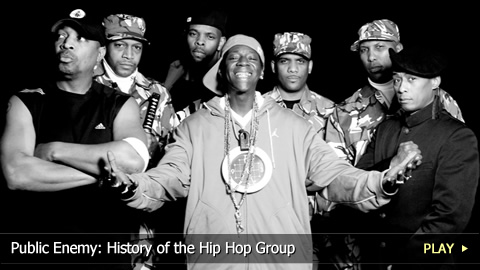Public Enemy: History of the Hip Hop Group

Formation
Hip hop group Public Enemy formed in Long Island, New York in 1982. MC Carlton Douglas Ridenhour – otherwise known as Chuck D – was performing with DJs Hank and Keith Shocklee under the name “Spectrum City” when they bonded over musical and political interests.
Def Jam Records
They added William Jonathan Drayton Jr. – or Flavor Flav – to their crew, and independently released the record “Public Enemy No. 1” in the mid-1980s. After catching the attention of future super-producer Rick Rubin, Chuck signed with Def Jam Records in 1986.
Public Enemy
With him, he took hype man Flavor Flav, Norman Rogers or DJ Terminator X, as well as members of “Spectrum City” like Professor Griff, and the S1W security/dance troupe, and Public Enemy was ready to be heard.
Debut
After opening for the Beastie Boys, Public Enemy released their critically-acclaimed debut in 1987. Yo! Bum Rush the Show became one of hip hop’s most influential albums.
Golden Age of Rap
Thanks to the creativity and rapping techniques found on their next few releases, Public Enemy helped spark the golden age of rap. Their 1988 sophomore album It Takes a Nation of Millions to Hold Us Back proved even more successful than their debut and won fans across other genres. Hit singles like “Don’t Believe the Hype” and “Black Steel in the Hour of Chaos” made this socio-politically charged effort one of history’s best rap records.
Controversy
Unfortunately, things hit a snag when certain lyrics were called into question and some members made controversial off-stage remarks. In fact, Professor Griff was dismissed after making apparently Anti-Semitic comments.
“Fear of a Black Planet”
1990’s Fear of a Black Planet addressed social issues like race relations, as well as the organization and empowerment of African-Americans, and sold one million copies in its first week. Produced by the band’s in-house team “The Bomb Squad,” it featured the famous track “Fight the Power” and was hailed as one of hip hop’s most significant records. A different version of this single had previously been released on the film soundtrack for “Do the Right Thing.” The entire well-received album was later preserved by the National Recording Registry.
Social Commentators
In 1991, the group dropped the phenomenally successful Apocalypse 91...The Enemy Strikes Black. After peaking at number four on Billboard, that record cemented Public Enemy’s status as social commentators with songs like “By the Time I Get to Arizona” and “Can’t Truss It.”
More Music and Other Projects
The band then came out with Muse Sick-n-Hour Mess Age in 1994. Despite a top twenty debut it quickly fell off the charts, and group members pursued other projects. However, 1998’s top thirty record He Got Game marked their comeback, and served as the soundtrack to a film of the same name.
The Digital Age
For their next effort, Public Enemy switched to indie label Atomic Pop Records. They became one of the first bands to embrace the internet as a distribution tool when they allowed the label to digitally release tracks from 1999’s There’s a Poison Goin’ On before the album’s physical release.
Music in the Twenty-First Century
In the late ‘90s, Professor Griff rejoined the band and DJ Lord replaced DJ Terminator X. During the new millennium, Public Enemy continued releasing critically-applauded albums, but was unable to recapture the commercial success of their earliest work. They scheduled the release of their thirteenth studio album, Most of Our Heroes Don’t Appear on a Stamp, for 2012.
Outside Projects
Outside the band, members kept busy: Chuck D became an author, activist, public speaker and producer; Flavor Flav starred on reality TV; and Professor Griff lectured about the music industry.
Impact on Hip Hop
With their insanely complicated, sample-laden beats, and their political opinions, Afro-centric focus and awareness-raising lyrics, Public Enemy dared to do what hadn’t been done before: they proved there was more to their artform than superficiality. They used rap as a tool to convey messages of power and to show the world they would not sit idly by. Artists like Queen Latifah and A Tribe Called Quest took cues from the band and also made this a main focus in their music, and this confirmed the group’s enduring impact on hip hop.
This is why they will always be considered Public Enemy #1.
